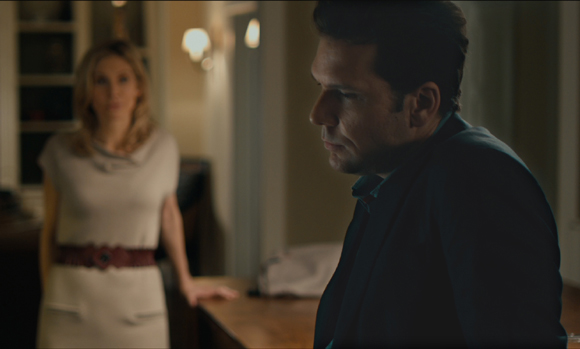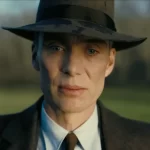Disconnected, by David Bax
Matthew Leutwyler’s Answers to Nothing is another one of those movies with a bunch of overlapping stories seemingly intent on proving that we are all connected in some way, a sentiment which may be the exact polar opposite of profound. You know these movies. Some of them win Oscars (Crash). Some of them are correctly forgotten (The Safety of Objects). Some of them are foreign, which doesn’t make them any less stupid (Happenstance). This one will likely fall into the second camp, despite containing a handful of surprisingly accomplished elements hidden among its banalities.
Dane Cook plays a therapist named Ryan who is married to a lawyer named Kate (Elizabeth Mitchell). Kate is representing a woman named Drew (Miranda Bailey) fighting for custody of her brain-damaged brother, Erik (Vincent Ventresca). Kate’s sister is a detective named Frankie (Julie Benz) who is investigating the disappearance of a young girl. Mark Kelly plays a school teacher named Carter who is obsessed with the news of that girl and whose neighbor, Jerry (Erik Palladino) has just graduated from the police academy. Ryan, meanwhile, is having an affair with Tara (Aja Volkman), a musician who plays at a club where the sound guy is named Evan (Zach Gilford). Evan begins to date Allegra (Kali Hawk), a sitcom writer who happens to be a patient of Ryan’s.
Believe it or not, there are some smaller characters and storylines I’ve left out of that description. In any case, the denseness of the script, just like in the other examples of this subgenre listed above, is an apparent attempt to cover up the lack of originality. Each of these stories, were they to stand on their own, would be either painfully predictable or end with plot twists that would inspire eyes to roll. As they are presented here, we are never given much chance to think about the narratives because we’re constantly on to the next one. I guess that’s our good luck.
For as lame a script as Leutwyler wrote (with the help of Gillian Vigman), he does manage to assemble it as well as, if not better than, could be hoped for. He is apparently much subtler with a camera than with a pen. He frames things with an unforced realism, putting us alongside the action in a believable and unobtrusive way. This gentle touch works as the glass of water that makes swallowing his pills of ham-fisted dialog much easier. And the one sequence that could be described as “action” is presented remarkably well, even if its plot elements are ludicrous.
This kind of screenplay is a proving ground for actors. The gargantuan number of roles means that each character is afforded a small amount of screen time to do what they can. Perhaps it’s due to Leutwyler’s talents as a director that no one here is truly bad. The least that can be said of some performances (Cook, Benz) is that they bring nothing extra to the material. Meanwhile, others like Mitchell, Palladino and Bailey reveal themselves to be true craftsmen, imbuing depth by embodying their characters, not just saying their lines.
Thematically, as discussed above, these kinds of movies are all sort of about the same thing. We are all connected. Answers goes slightly beyond this but not far enough or deep enough to make it a stand-out among its brethren. Carter’s inability to stop thinking about the missing girl raises the noble notion (one with which I happen to fully agree) that as members of the same society, we are responsible for one another. Multiple scenarios involving parents, children and siblings explore the nature of family, be it by blood or marriage. The film’s best and most pragmatic message is that we are all to some extent defined by how people we don’t know see us, no matter how we see ourselves. If you are black, if you are a cop or if you are a single adult male who eats his lunch alone in a park where children play, those things are a part of you for the simple reason that everybody says they are.
Any lasting impact the film’s themes may have had is irrevocably marred by its ending. Really, that should be endings, given how many stories there are. The main emotional climax of the film is reached in two crescendos, each ridiculous in its own way. As usual, there will be no spoilers here. I will only say that one ending heavily tests our suspension of disbelief and the other is even more shallow and predictable than the film’s extant clichés could have prepared us for.
Answers to Nothing is simultaneously better than one would expect and not as good as it could have been. It repeatedly verges on redeeming itself but then crashes back to the ground with its hollow predictability.































